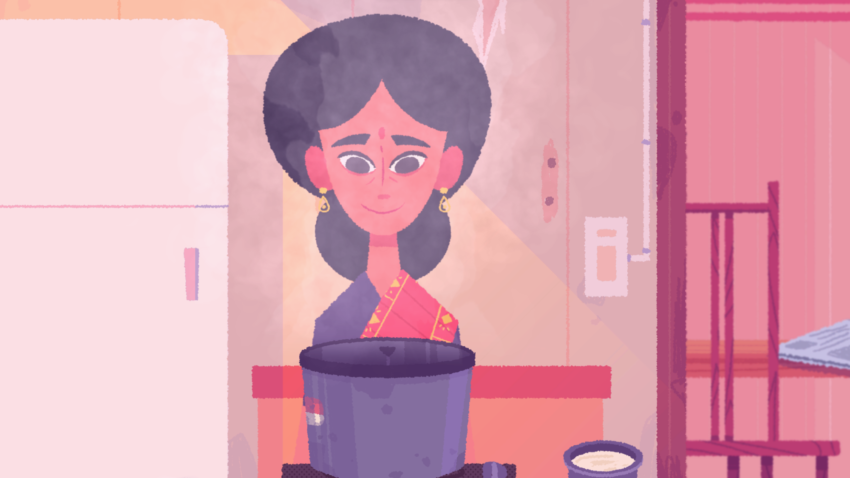Venba is a short narrative cooking game about an Indian mom who immigrates to Toronto, Canada with her husband in the 1980s. The game came out in late July 2023 and it was developed and published by Visai Games. The game was reviewed on Steam.

Story
Story spoilers ahead!
The story centers around Venba herself, who we see in her younger years up until the 2000s where her son is now a full grown adult. Venba—or Venpa, as described in the game—is also the name for a specific form of Tamil poetry (Tamil being a native language spoken in South India and Sri Lanka).
Throughout the game, Venba’s family expands with the birth of her son, Kavin. Venba begins cooking traditional Tamil meals, using her mother’s old recipe book. In there, many of the recipes are missing pieces due to Venba’s lack of care in carrying the book with her over the years.
Together with Venba, the player must solve the puzzles to cook the ingredients in the correct order: it’s a fail-pass situation, since the game gently encourages the player to start over when the recipe is not completed in the correct order. The stakes are low, and the puzzles are not overly complicated.
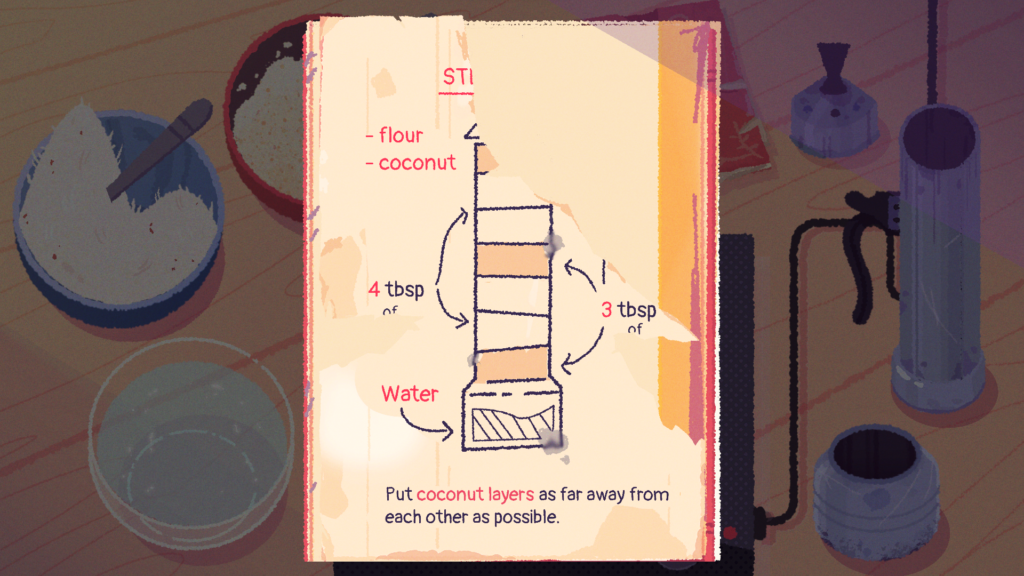
As the years pass in-game, we get to explore Venba’s feelings and emotions, from her love for her family and her culture to her sadness, her fears, her discomfort in watching her son grow up more and more detached from her and the Indian identity.
The game doesn’t exactly pull punches when it comes to depict the sad, harrowing realities of immigration. As a (white) immigrant myself, I felt kinship with some of the struggles that were narrated in the game, and the only consolation I had was that my experience had not been made harder by my looks. Venba—and her husband Paavalan and her son Kavin—talk amongst themselves about the struggles of being BIPOC in Canada.
Struggles that, with time, push Kavin further and further away from his language, his heritage, his culture and, by proxy, his mother. The generational conflict is amplified by the struggles of a family who is simply trying to survive in a world that is not kind to them, with Venba clinging to her history and culture, and with Kavin distancing himself from it.
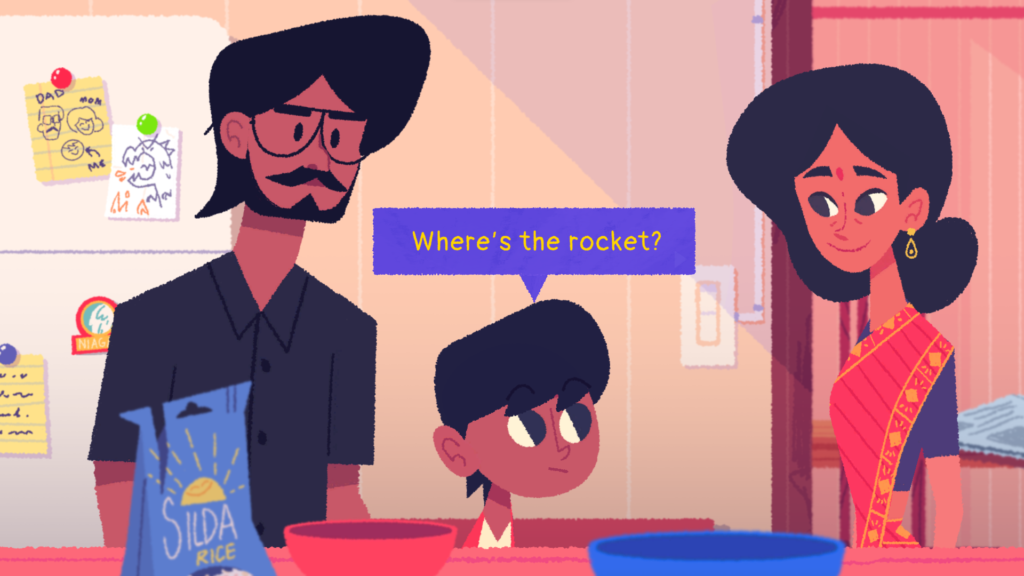
Despite being so gut-wrenchingly real, Venba manages to keep a light shining through it all: a hope of resolution and a love for these three, charismatic, multi-faceted characters. It’s actually quite impressive how much personality the developers managed to imbue in this family despite the short length of the game. Venba is both sad and heartwarming, with a depth to it that I had not expected when I first started playing it.
Game Style & Mechanics
Venba‘s focus is truly the narrative: the story is what drives the whole game, but the small cooking puzzles are incredibly enjoyable nonetheless.
The story is told through still panels, with very limited animation. Despite the lack of movement, the game doesn’t lose any of its charm. If anything, it helped me focus on the colors, the details, the narrative itself.
The dialogue paths are, for the great majority, pre-set. On a few occasions, the player has the opportunity to select between options in branched conversations, but the topic remains the same regardless of the player’s choice. This hinders the game replayability, but it still encourages the player to do a second run to see how the other options change the wording or metaphors being used.
But what I found really smart was the set up of the puzzles: Venba is first trying to replicate her mother’s recipes despite the book missing page bits; but when the book passes down to Kavin, the son, we find out that the pages have been repaired and rewritten… in Tamil!
Which takes Kavin, and the player, on a journey that forces us to puzzle our way through new recipes in a language we don’t understand. For us, the players, that means finishing each recipe correctly. But for Kavin it means reaching through time and space to get back in touch with his roots, his culture, and his mother, through food.
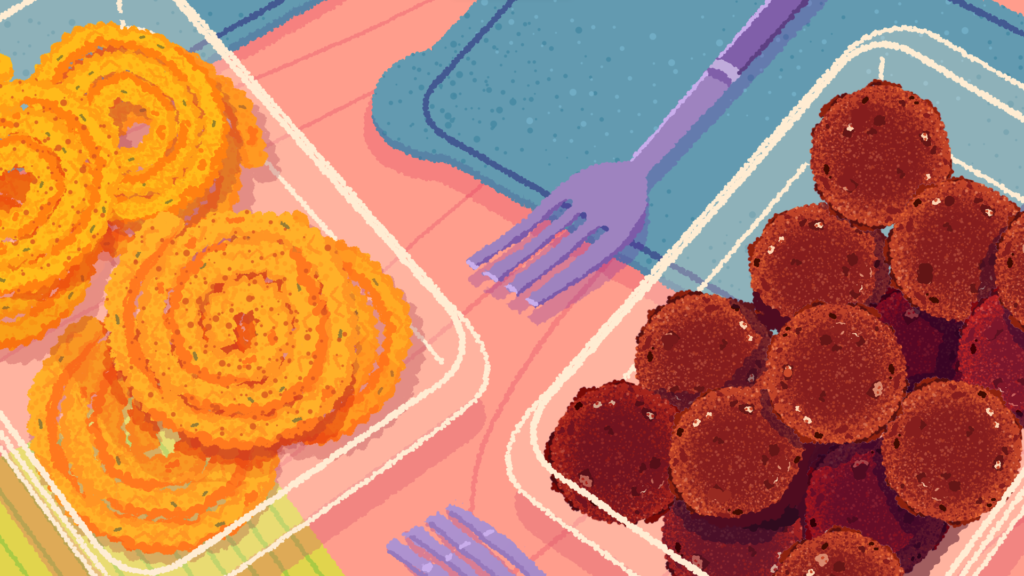
Game Design and Music
The game is drawn gorgeously. The illustration style is like nothing I’ve seen before, with frayed edges for each drawing and vibrant, emotionally charged colors and lights. The backgrounds are painstakingly detail-packed, with a symbolic decorative mask that accompanies the family occasionally giving a cheeky wink or blinking slowly in the direction of the characters.
Even the speech bubbles are smartly designed to represent English versus Tamil, with the first appearing in yellow font, the second in white, and a mix of the two being characterized by a muddied looking dialogue bubble when Kavin speaks a blend of both languages.
The soundtrack is aptly crafted, using Tamil music to guide us through the story. While some tunes hit right in the chest with their melancholic feelings, some others are upbeat and full of energy, and each track truly did a wonderful job accompanying me through the narrative.
The sound effects, too, are simply delightful. Starting with the cooking noises when putting together the dishes that are incredibly accurate and immediately made me feel like I was in front of a frying pan… Without the side effect of actual oil spraying everywhere, of course.
Between the sounds and the visuals, I swear I could smell the spices cooking as I was setting the ingredients in the right places.
Venba’s soundtrack is available for purchase on Steam.
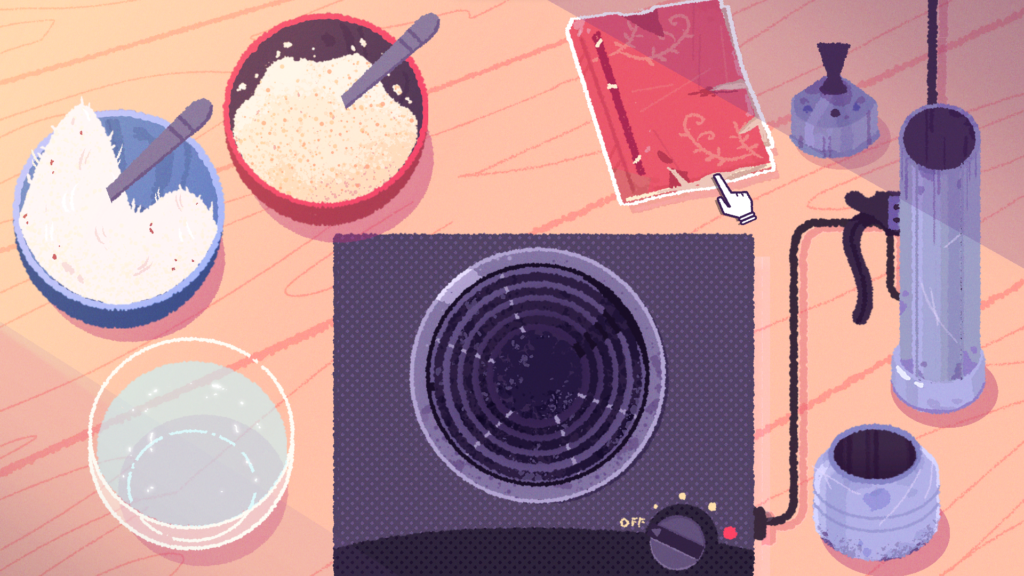
Would I recommend it?
Yes, absolutely. Venba is a short, lovely game, and through the restoration of the lost recipes while cooking mouth-watering Tamil dishes, players can really feel the connection Venba had with the home she had to leave behind.
I was also pleasantly satisfied by the mature, accepting and thoughtful parenting style that is indicative of loving, smart and good-hearted parents. For the first time in a game, I felt closer to the parents than to the kid—although that was probably the main goal of the story anyway.
The only downside of this lovely game is that it’s not meant to be replayable. Not really. The story is beautiful, but given that the dialogues are always the same—even with the occasional player choices—Venba poses more like a movie than a game in a way.
It’s not necessarily a bad thing! I’m quite happy I had the chance to play it, and happy that I can have it sitting in my library to replay it in the future.
Venba’s list of achievement is very short as well, and they are easily attainable: for the great majority, they are achievable by completing the game, with only a couple of them being specific to player choices (such as doing every recipe without making mistakes or scrolling through the messages on Venba’s and Kavin’s phone).
But the puzzles are smart and simple enough, and it’s an easy game to replay if one so wished—it only took me two hours for the first playthrough and one and a half hour for the second.
I’m truly enamored by this vibrant game, and I truly hope to see more narrative short games like this in the future. They are the perfect way to spend a cozy afternoon, immersed in a beautiful, heartfelt story of love, family and community.

Meet the Author
Chloe is an Italian-Canadian writer, voice actor and archaeologist-to-be. Currently living in the beautiful Calgary, Canada, they spend their time playing Overwatch, Mass Effect and cozy, open world games.
You Might Also Like: Best Cozy Cooking Games on Steam
